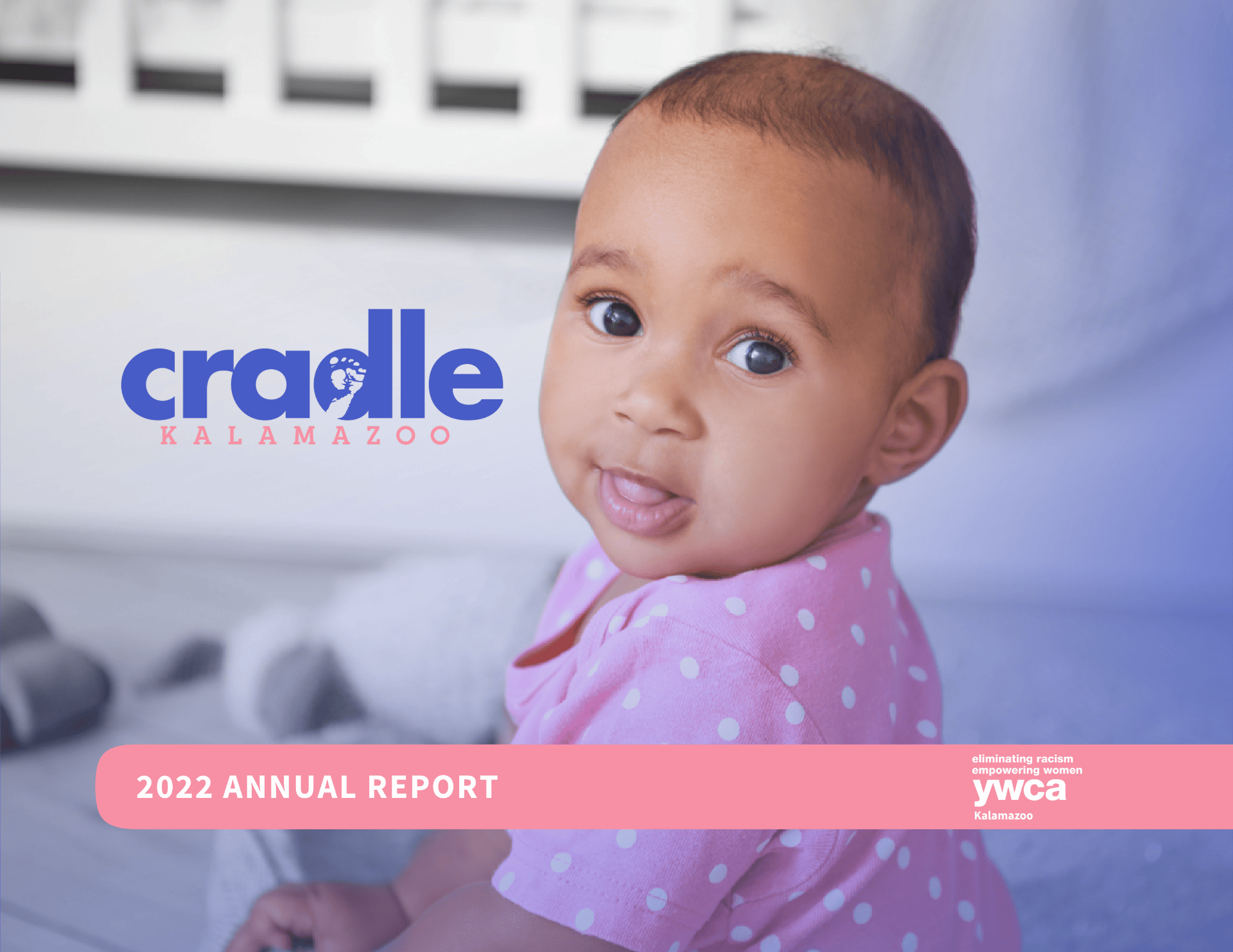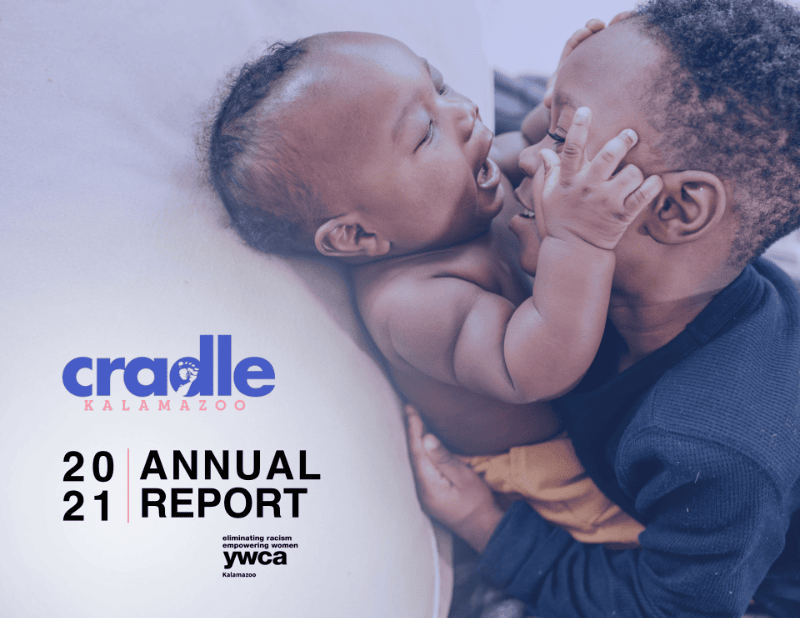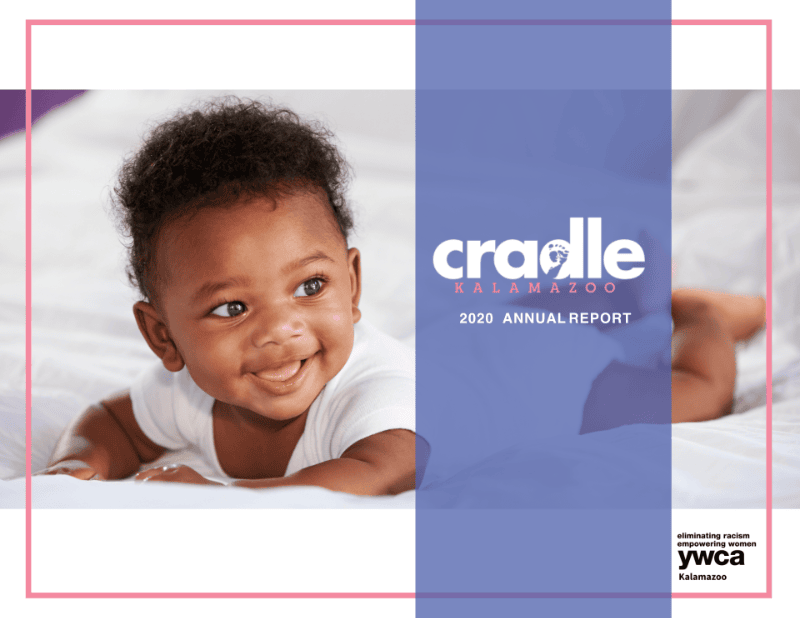About Cradle Kalamazoo
Cradle Kalamazoo, is a multi-agency community initiative that aims to identify and implement evidence-based and holistic interventions to reduce infant death and promote respect for families, women, and their children. Cradle Kalamazoo’s scope has been maternal-infant health, as pregnant women have been a priority focus from our inception. Our strategies are data-driven from our Fetal Infant Mortality Review Team (FIMR) to create best practice recommendations that are specific to the needs of our community.
What We Do
Cradle Kalamazoo offers programs in the following priority areas: Health Equity, Family Support Services, Reproductive Health, and Safe Sleep.
Family Support Services
Cradle Kalamazoo understands that pregnancy and raising children can be difficult. It takes a village to raise a child. Cradle Kalamazoo is coordinating care and services offered by Family Support Programs that are dedicated to providing support services for pregnant/expectant mothers and infants. These programs offer resources for parents and infants both inside and outside the home. Our Family Support Programs are family-focused and work with all members of a family to ensure mothers have a healthy pregnancy and infants have a healthy start in life.
Families who participate in home visiting programs benefit from improved maternal, infant, and child health. Services promote positive parenting techniques, healthy child development, and school readiness. Home Visitors provide referrals to other support services for families in need. Family Support Programs work together to ensure that you are receiving the best services possible and the concerns you identify together are resolved.
For more information or to enroll in a program, please contact (269) 366-6201 or visit our resources page.
Fetal Infant Mortality Review
Kalamazoo County Health and Community Services and Western Michigan University Homer Stryker M.D. School of Medicine are leading Kalamazoo’s Fetal-Infant Mortality Review (FIMR). FIMR is conducted monthly in order to understand and improve the factors that contribute to infant death in our community.
For more information visit the Kalamazoo County Health and Community Services’ FIMR page.
Health Equity
Cradle Kalamazoo believes that health equity is a key component needed by organizations to effectively provide services to pregnant/expectant mothers, infants, and their families. Health Equity is the state in which everyone, regardless of identity (e.g., race, class, gender identity), has the opportunity to attain full health and no one is disadvantaged from achieving this. Health Equity is accomplished when institutions across sectors commit to becoming anti-racist organizations and remove obstacles to health — such as discrimination, poverty, deep imbalances in power, wealth, and resources — and their consequences, including racial disparities in infant mortality and birth outcomes. For more information on health equity, visit the Healthy People 2030 site.
Cradle Kalamazoo is striving towards educating community members and creating policies that empower individuals, programs, and institutions to become more culturally competent. Our partners learn about the history and environment that have contributed to the high racial disparities in infant death. They are also encouraged to make changes within their institutions that can facilitate understanding, communication, and access to services for mothers, expectant women, and their families. By bridging the cultural norms of service providers and clients/patients, we as a community will help reduce infant deaths.
Reproductive Health
Cradle Kalamazoo is providing the community with Reproductive Health Education to promote spacing between births and healthy planned pregnancies. Unplanned and rapid repeat pregnancies can lead to infant death. Rapid repeat pregnancies can result in babies that are too small and/or born too soon. Through education, families can better plan for their pregnancies. Our approach is to be respectful of everyone’s religious and cultural beliefs, preferences, privacy, and personal circumstances.
To learn more about Reproductive Health Education visit our resources page.
Research
Through continuous data collection and evaluation of key indicators by Cradle Kalamazoo partners, together we strive to identify and assist at risk pregnancies and infants in Kalamazoo County. This information will guide us in updating and evolving programs to better serve our community.
Here is some of the research Cradle Kalamazoo is using to support our work —
Cathy Kothari, PhD with the support of Kalamazoo County Healthy Babies Healthy Start, performed an Infant Mortality Trend Analysis. In this study, Dr. Kothari found:
- In Kalamazoo, babies of color are 4x more likely to die before their first birthday than their white neighbors.
- Babies of color are affected across income. Babies of color from higher income families are twice as likely to die before their first birthday than their lower income white neighbors.
- Although infant mortality is high among all infants of color, the reasons infants die varies based on their family’s income. Many lower-income infants of color are dying from sleep-related causes and higher income infants of color are dying largely due to prematurity.
- The race of the infant affects infant mortality risk more than their family’s socioeconomic status.
- Most infant deaths are preventable. Through specialized interventions, racial disparities in infant death can be reduced and eventually eliminated.
Safe Sleep
Cradle Kalamazoo is working to ensure that every baby has a safe sleep environment. Unsafe sleep environments are a leading cause of infant death and are completely preventable. Sleep Safe is a nationally recognized program to help protect your baby from sudden unexpected infant death syndrome (also called SUIDS), suffocation, and other sleeping related dangers.
We recognize the importance of culture and individual preferences for child bearing and child rearing. We also recognize that safe sleep education is an on-going conversation and not a lecture. Cradle Kalamazoo uses innovative ways to communicate with parents, grand parents, caregivers, health care providers, child care providers and everyone helping with caring for a baby.
For tools and to learn more, visit the “Safe Sleep” section of our resources page.
Goals
Cradle Kalamazoo’s goal is to reduce infant death and promote respect for families, women and their children. We plan on doing this by:
- Ensuring health equity of programs, policies, and providers
- Coordinating a perinatal home visitation network
- Promoting and educating about infant safe-sleep programs
- Providing reproductive health education and support
- Advocating for local and state public policy initiatives to support maternal-child health
- Shifting policies, practices, and procedures to ensure early and equitable access to prenatal and postpartum care in clinical sites with hospital-system partners
Partners
Cradle consists of 24+ Community Partners that are committed to improving birth outcomes by creating zero disparities in infant mortality between Black and White babies born in Kalamazoo. Our goal is to report an overall infant mortality rate of less than 3.0 per 1,000 live births in Kalamazoo.
Full List of Partners
Cradle Kalamazoo would not have been possible without the dedication and support of many individuals and the following organizations
- Ascension Borgess Health
- Bronson Healthcare
- Eliminating Racism Creating/Celebrating Equity (ERACCE)
- Elizabeth Upjohn Community Healing Center
- Family Health Center
- Fatherhood Network
- Goodwill Industries of Southwest Michigan
- Integrated Services of Kalamazoo
- Interfaith Strategy for Advocacy and Action in the Community (ISAAC)
- Kalamazoo Community Foundation
- Kalamazoo County Government
- Kalamazoo Promise
- Kalamazoo Regional Educational Services Agency (KRESA)
- NAACP – Metropolitan Kalamazoo Branch
- Northside Ministerial Alliance
- Open Doors Kalamazoo
- Planned Parenthood of Michigan
- Rootead
- Twenty Hands
- United Healthcare Community Plan
- United Way of the Battle Creek and Kalamazoo Region
- Western Michigan University Department of Psychology
- Western Michigan University Homer Stryker M.D. School of Medicine
- YWCA Kalamazoo
Funders
Thank you to our funders! Without them, the work of Cradle Kalamazoo wouldn’t be possible.
Strategy
Cradle Kalamazoo follows a collective impact strategy that progresses from collaborative planning and capacity building to target community actions and intervention to community system changes. Launched in 2014, Cradle Kalamazoo, previously know as Kalamazoo Infant Mortality Community Action Initiative (KIMCAI), centers its work on a public health model that recognizes people live in a social and environmental context that affects their health. A combination of distal (structural, political, and economic) factors and more proximate (community, organizational, family, and individual) contribute individually and together to explain the observed phenomenon of racial disparities in infant and maternal mortality. As such, work toward overcoming these factors must include organizations that touch on these varying distal and proximate factors.
Commitment
Cradle Kalamazoo is committed to improving birth outcomes in our Community through deliberate and intensive communitywide action, which combines grassroots engagement, a focus on Equity and Health Equity, evidence and practice-based programs, targeted service delivery, institutional coordination, and measured accountability.
YWCA Kalamazoo, a nonprofit, 501 (c)(3) organization, serves as a primary resource for economic, gender and racial justice for all women, children and families in Kalamazoo. YWCA Kalamazoo is the fiduciary for the Cradle Kalamazoo collaboration. As such, YWCA Kalamazoo acknowledges and receipts all grants and philanthropy for Cradle Kalamazoo with rare exceptions when the funder of a grant or an individual philanthropist requires or insists their funds go directly to a different organization.
Board Members
Health Equity Subcommittee Chairs
Danielle Raymond, RN
Ashanté Collins
ISAAC Kalamazoo
Frontline & Care Coordination Subcommittee Chairs
Jeaninne Butler-Sytsema
Director of Maternal & Child Health,YWCA Kalamazoo
Brenda OʼRourke, RN, BSN
MCH Division Manager, KCHCS
Fetal Infant Mortality Review
Nia Evans, MPH
Population Health Research Coordinator, Western Michigan University Homer Stryker MD School of Medicine
Reproductive Health Sub-Committee Chairs
Cassy Jones-McBryde
Community member
Sravani Alluri, MD
Assistant Professor in the Department of Family and Community Medicine/Director of Street Medicine Kalamazoo, Western Michigan University Homer Stryker MD School of Medicine
Ascension Borgess
Dr. Jennifer Frink, DO
OB/GYN Department Chair
Bronson Health
Aaron Lane-Davies, MD, FAAP
Chief of Quality, Bronson Medical Group
Family Health Center
Denise Crawford
President & CEO
Integrated Services of Kalamazoo
Dianne Shaffer
Director of Systems Development
KZCF
Sandy Barry-Loken
Vice President of Grants
Jennifer Heymoss
Vice President – Initiatives and Public Policy
KCHCS
Jim Rutherford
Health Officer/Director
Deb Lenz
Deputy Health Officer Health & Community Services Department
NMA
Pastor Addis Moore
President, NMA
Pastor Lenzy Bell
Vice President, NMA
UWBCKR
Alyssa Stewart
VP, Impact & Engagement
WMed
Cheryl Dickson, MD, MPH
Associate Dean Health Equity and Community Affairs
Lisa Graves, MD
Associate Dean Faculty Affairs/Interim Chair Department of Family and Community Medicine
YWCA
Demetrias Wolverton
Vice President of Social Justice & Advocacy
Voting Ex Officio
Cathy Kothari, PhD
Cradle Kalamazoo Senior Epidemiologist



